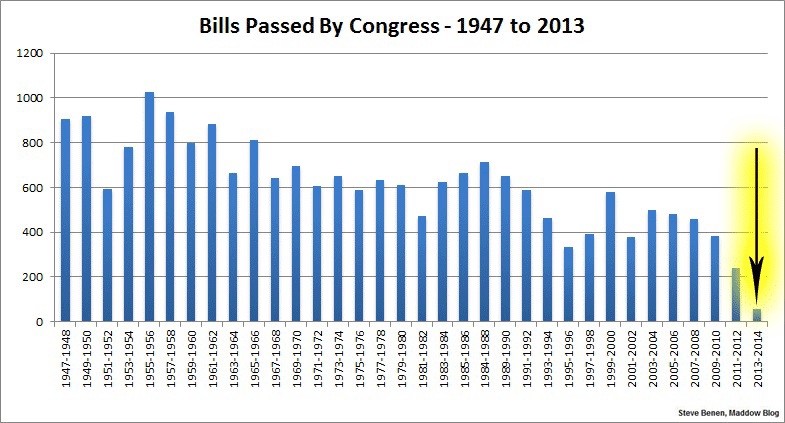Do Nothing Congress Presented National Loser's Award for 2013

We at BootheGlobalPerspectives noticed this article from the The Rachel Maddow Show "Giving new meaning to ‘Do-Nothing’ Congress" and this persuaded us to present the first Annual Loser's Award to the US Congress for 2013, because of the losses to the American People (and the USA) brought about by this Do Nothing bunch of clowns. We credit Steve Benen and MSBN for publishing the below article because it is timely and informative.
"If all goes according to plan, the Senate should wrap up its work for 2013 today and join the House on a holiday break. For his part, President Obama will sign the budget agreement into law before the end of the year, too.
And when he does, that will bring the grand total of bills signed into law in the 113th Congress to … 58. As Billy House noted this morning, that’s not an especially impressive number.
If you thought Congress hit rock-bottom in terms of how many laws they enacted last session, check out the current House and Senate.
Congress will close the year with 58 public bills (the congressional term for measures with broad impact) enacted into law, assuming that President Obama signs the budget deal as promised. They may add a few to that in the last few days of the year. But it won’t change substantially.
That’s the lowest one-year output since at least 1947, and only the tiniest fraction of the 6,366 bills introduced by lawmakers, according to House and Senate records.
The historic metrics are rather striking: 2013 was the least productive for any Congress since clerks on the Hill started keeping track, and this Congress is on track to pass fewer laws than any modern Congress.
Indeed, it’s really not a close contest. The above chart is admittedly misleading since the 113th Congress is only half complete and I’m comparing it against two-year totals, but note that if lawmakers are as productive in 2014 as they’ve been in 2013, they’ll demolish the record for inaction. If lawmakers suddenly turn things around and double their efficacy – if, in other words, they show a 200% year-to-year increase in the number of bills passed into law – this will still be the last productive on record by a considerable margin.
In fairness, plenty of political scientists will tell you that a straight-up count of successful bill signings isn’t the ideal metric for evaluating a Congress. It’s a fair point – quality tends to matter more than quantity, and if a Congress passes worthwhile legislation, that arguably matters more than the raw totals.
But in the current case, this caveat doesn’t help the current crop of lawmakers – they haven’t been passing good bills, either. On the contrary, the most notable legislative development of 2013 was the Republicans’ decision to shut down the government for reasons they still can’t explain. Meanwhile, routine bills that are ordinarily passed with minimal fuss, such as the farm bill, have languished.
For his part, House Speaker John Boehner (R-Ohio) said this year that the best way to evaluate Congress isn’t by legislation it passes, but rather, Congress “ought to be judged on how many laws we repeal.”
But even on this metric, if we accept the Speaker’s standards at face value, this Congress is still laughable since it hasn’t repealed any laws, either.